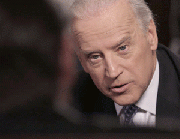WASHINGTON — Seeking to end speculation about whether his administration had eased its opposition to an Israeli military strike against Iran’s nuclear facilities, U.S. President Barack Obama Tuesday insisted that Washington’s position remained unchanged.

|
|
Biden speaks to George Stephanopoulos on ABC’s This Week. Lauren Victoria Burke/ABC |
“Absolutely not,” Obama replied. “And I think it’s very important that I’m as clear as I can be, and our administration is as consistent as we can be on this issue.”
His denial came amid growing confusion here since Sunday when Vice President Joe Biden told a Sunday news show that Israel, as a “sovereign nation,” could determine for itself how to deal with the threats allegedly posed by Iran’s nuclear program.
“[W]e cannot dictate to another sovereign nation what they can and cannot do when they make a determination, if they make a determination that they’re existentially threatened and their survival is threatened by another country,” Biden told host George Stephanopoulos on ABC’s This Week.
Biden’s statement — which contrasted sharply with his warning three months ago that Israeli Prime Minister Binyamin Netanyahu would be “ill advised” to carry out an attack on Iran — resulted in a sharp spike in speculation that the administration had hardened its position against Iran, particularly in the wake of the last month’s elections there and the crackdown against the opposition that followed it.
A number of neo-conservatives and other hawks have been pointing to the disputed re-election of President Mahmoud Ahmadinejad and the subsequent violent repression of protesters as additional reasons why it made no sense for Obama to pursue his engagement strategy with Tehran.
“[W]ith no other timely option, the already compelling logic for an Israeli strike is nearly inexorable,” wrote American Enterprise Institute (AEI) fellow John Bolton in last Thursday’s Washington Post. “Israel is undoubtedly ratcheting forward its decision-making process. President Obama is almost certainly not. He still wants ‘engagement’ (a particularly evocative term now) with Iran’s current regime.”
In addition to the repression in Iran, last month’s move by a prominent Iran hawk, Dennis Ross, from the State Department to a senior position in the White House overseeing policy in North Africa, the Middle East, and the Gulf added to speculation that the administration was leaning toward a more confrontational policy.
Before joining the administration, Ross had signed on to reports that not only called for increasing coordination between Israel and the U.S. on Iran policy, but for using the possibility of an Israeli attack on Iran as leverage in a negotiating process.
In a book released this year, co-authored with Washington Institute for Near East Policy’s David Makovksy, Ross writes that a “hybrid approach” of engagement and pressure will allow the U.S. to engage at low costs. The Washington Post’s Glenn Kessler paraphrases Ross and Makovsky’s argument by noting that “the ‘hard choices’ of stern deterrence or military strikes on Iran would gain greater worldwide acceptance if diplomacy were tried first.”
Moreover, a weekend report by London’s Sunday Times that Israel had secured Saudi Arabia’s approval to overfly its airspace in an attack on Iran — a report that was “categorically” denied by the Saudi government Monday — also added to the notion that Washington’s policy had taken a sudden turn.
It was in this context that Biden’s interview drew particular interest.
Asked whether he approved of Netanyahu’s “tak[ing] matters into his own hands”, Biden seemed to suggest that the U.S. would not attempt to dissuade Israel from taking unilateral action.
“Look, Israel can determine for itself — it’s a sovereign nation — what’s in their interest and what they decide to do relative to Iran and anyone else,” said Biden.
While some analysts insisted that Biden’s statements did not constitute a change in policy, others insisted that his failure to state explicitly that Washington would oppose an attack, as the vice president had done last April, suggested neutrality at best.
Moreover, according to some analysts, so long as his remarks did not at least imply that Washington oppose such an action, it would likely be understood in Iran as a “green light” with the likely result that hard-liners within the regime would use it to rally elite and popular opinion and thus strengthen their position at a moment when they were under unprecedented domestic pressure due to the election.
“Dangling the threat of Israeli military action over Iran is more likely to trigger nasty unintended consequences than to help stabilize the Middle East. And when it comes to the question of an Israeli air strike, Obama can profess neither neutrality nor powerlessness,” wrote Time.com senior editor Tony Karon on his personal blog, calling for Obama to say “loudly and clearly not only that it opposes any attack on Iran by Israel, but also that it will do whatever is in its power to prevent such an attack.”
That consideration may have played a role in Obama’s decision to halt any further speculation about the hardening of the administration’s position Tuesday, even at the risk of embarrassing his vice president.
“I think Vice President Biden stated a categorical fact which is we can’t dictate to other countries what their security interests are,” Obama said in Moscow. “What is also true is that it is the policy of the United States to try to resolve the issue of Iran’s nuclear capabilities in a peaceful way through diplomatic channels.”
“I as the commander in chief preserve the right to take whatever actions are necessary to protect the United States. But we are committed to a peaceful resolution to this conflict and I think it is still possible, but ultimately if we present an opportunity to the Iranians at some point, they’ve got to seize that opportunity,” he said.
While his statement may indeed succeed in quashing further speculation about a major change in U.S. policy, it’s not yet clear how it will be received — and used — by hard-line factions in Iran, or, for that matter, in Israel.
Netanyahu has made little secret of his hopes that Obama will set a definite deadline — as early as September — for diplomatic efforts to engage Iran on its nuclear program to bear fruit before taking punitive measures. Obama, on the other hand, has until now resisted such pressure, suggesting that he will decide early next year whether the diplomatic route is likely to yield substantial progress in limiting Tehran’s nuclear program.
On Tuesday in the Washington Times, Eli Lake wrote that two Israeli officials told him that the Israeli government had not even asked Washington for a “green light.”
Last year, then-Israeli Prime Minister Ehud Olmert reportedly requested equipment, including U.S.-made bunker-buster bombs, to carry out an attack against Iranian facilities. According to the New York Times, the request was rejected by then-President George W. Bush (2001-2009), who feared reprisals again U.S. forces and interests in Iraq and elsewhere.
Speaking at the same time as Biden, the top U.S. military official, Joint Chiefs chairman Adm. Mike Mullen, said that “any strike on Iran… could be very destabilizing.”
Most analysts here believe the ongoing political crisis inside Iran could further delay the engagement process, although some believe that the regime’s post-election weakness could make it more amenable to compromise.
-IPS






Leave a Reply